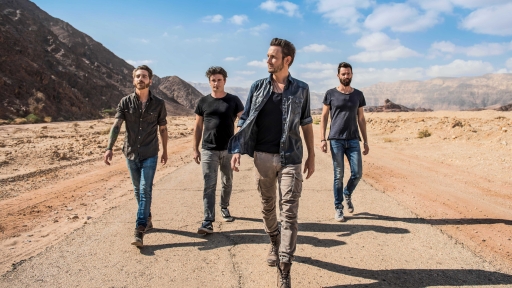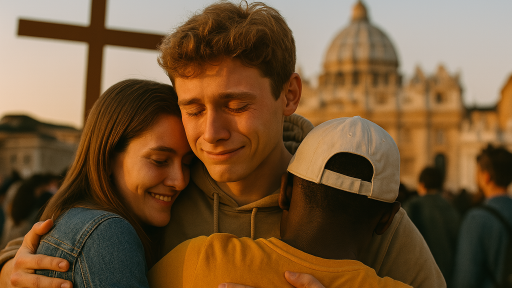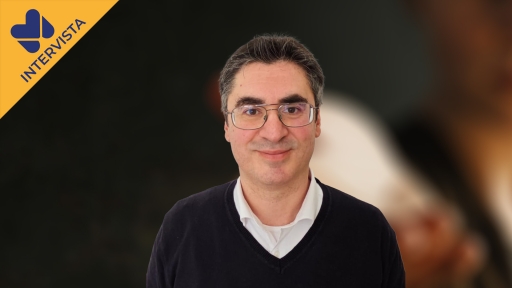"I need something that isn’t a screen, a notification, or a grade I have to nail."
Marta is 19, lives in Brescia, and is in her first year of Education Studies. When she decided to take part in the Youth Jubilee, she wasn’t thinking about a spiritual retreat or a traditional pilgrimage. She was thinking about herself.
"I always feel switched on. Between university, social media, and expectations… I can never shut my brain off. And even if everything around me seems normal, inside there’s a constant noise. I’m going to the Jubilee to stop. To find a real pause."
“Marta is describing something very common among today’s teens and young adults,” says psychologist Cristian Pagliariccio. “They live in a constant state of alert, under pressure to be visible, high-performing, always on top. That pressure comes from the merging of online and offline life, and often leaves no space for self-reflection or identity building.”
She’s not alone. From July 28 to August 3, 2025, hundreds of thousands of young people from across Italy and around the world will gather in Rome for the Youth Jubilee — a week of meetings, prayer, walks, music, and reflection, culminating in a vigil with Pope Francis on August 2 at Tor Vergata. A Church event, yes. But also a space for community, identity, and — for many — healing.
The Invisible Struggle
The World Health Organization has been saying it for years: youth mental health is in crisis. Anxiety, chronic stress, panic attacks, eating disorders, and depression affect millions of people aged 15 to 24. In Italy, the Ministry of Health estimates that 1 in 4 teenagers show clinically significant symptoms. Yet we still talk about it far too little.
Marta puts it bluntly:
"I’m not sick. But I’m tired. I can’t sleep well, I never feel like I’m enough, and I always feel like I have to be strong, brilliant, sorted. I’m not. And I wish that could be okay."
“What Marta says is crucial,” adds Pagliariccio. “We live in a society that allows us to speak, but rarely truly listens. That loneliness makes inner fatigue worse. And without the right psychological tools — like emotional education — it’s easy to feel inadequate, even when what you’re going through is completely normal.”
From Brazil to Rome: Another Voice
Thiago is 22, studying engineering in Porto Alegre, and will attend the Jubilee with Brazil’s university pastoral group.
"I went through a really hard time last year after the pandemic. I felt isolated, stuck to a screen, useless. A priest told me about this event, and I decided to go. To restart my body, my faith, my thinking."
Thiago says he’s not expecting miracles. "I’m not looking for perfect answers. I just want to be with others who are searching too. Who, like me, don’t just want to survive or 'function,' but really live."
“Thiago’s story shows how powerful it can be to step outside your usual context,” the psychologist notes. “An experience like the Jubilee can prompt new reflections on identity and allow someone to explore a version of themselves free from everyday pressures. It’s in these out-of-the-ordinary spaces that transformation can happen.”
Spirituality as Therapeutic Space
Can a religious event support mental well-being? For many, yes. The Jubilee offers a deeply human experience, far from the noise and fragmentation of daily life. Walking, silence, singing, confession, listening — simple acts, but powerful in their ability to center the self.
"At the Jubilee," Marta says, "I hope to find a space where I can look inside without shame. To breathe. Maybe even to pray with my own words, not someone else’s."
“These actions — walking, sharing, seeking silence — speak to deep, forgotten needs,” explains Pagliariccio. “In a world that keeps us constantly active, they become islands of calm. At first they may feel unsettling, but soon they become valuable refuges. The fact that everything happens in a group makes these moments emotionally contagious — in a good way.”
The Body Walks, the Mind Relaxes
Walking will be one of the Jubilee’s core experiences. Reaching the Holy Door on foot, taking part in night pilgrimages, crossing the city. Walking slows you down, clears your mind, brings you back to the present.
"Walking together, sharing the effort and joy without judgment — it brings peace inside," says Thiago. "You don’t need words. Just to be there."
“Walking,” the psychologist confirms, “also offers a physical and mental challenge. It reactivates the body, builds self-trust, and strengthens the sense of efficacy. All of that has very real effects on mood and emotional regulation.”
A Non-Clinical Medicine
The Jubilee isn’t a treatment program, but it can serve as an emotionally corrective experience — a time that breaks the routine, reignites energy, and opens new perspectives.
“It’s important to remember,” Pagliariccio emphasizes, “that the Jubilee is a spiritual event, not a structured mental health intervention. There are no formal psychological support services, which could be useful. But if experienced with awareness and good guidance, it can be transformative — as long as young people have tools to process what they’re going through.”
A Pause That Heals
For many young people, the Jubilee will be a pause. But not an escape. It will be an active choice for healing. A way of saying “yes” to oneself, even through pain.
"I’m scared of what I’ll find inside myself," says Marta. "But I’m more scared of living in constant apnea."
“The first advice I give to young people going,” Pagliariccio concludes, “is to let go of rigid expectations. Be open to surprise, don’t judge yourself, welcome what you feel. Well-being often starts with acceptance, not effort.”
And to those who are struggling but afraid to ask for help?
“What you’re feeling has a name. You are not broken. You’re not overreacting. You’re going through something hard, and that deserves respect and care. Strength is recognizing the need — and taking even a small step to share it. In that step, a new beginning can already be taking shape.”
In a world that rushes and consumes, the Jubilee invites us to walk and to listen. And every step, every word, every breath can become a small act of healing.
🕊️ Youth Jubilee – Rome 2025. The journey starts within.









